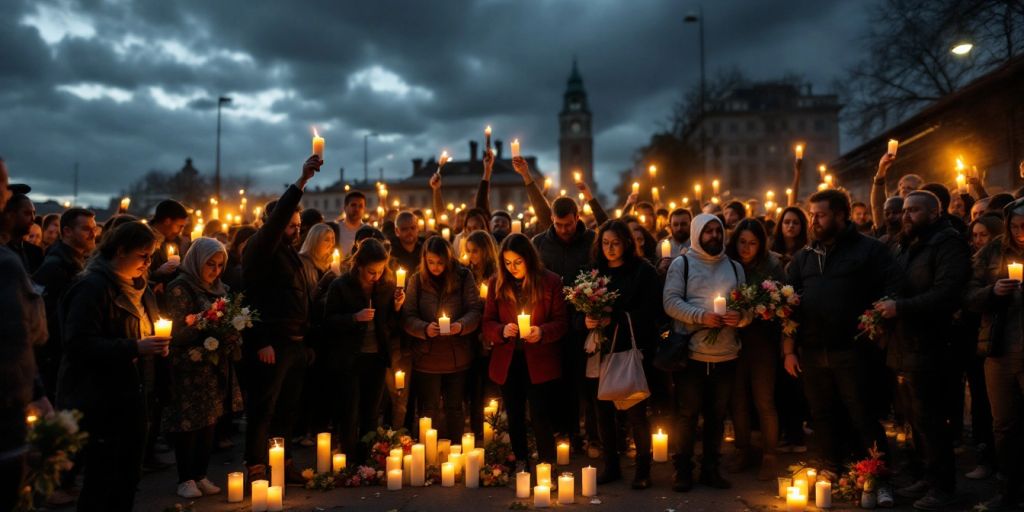A tragic incident at the Novi Sad railway station in Serbia has led to widespread protests, igniting public outrage over the deaths of 14 individuals following the collapse of a concrete canopy. Demonstrators are demanding accountability from government officials and calling for immediate action against those responsible for the disaster.
Key Takeaways
- Fatal Incident: 14 people died and several others were injured due to the collapse of a newly renovated canopy at the Novi Sad railway station.
- Public Outrage: Protests erupted in Novi Sad, with demonstrators demanding the resignation of key officials, including Prime Minister Milos Vucevic.
- Violence Erupts: The protests turned violent, leading to clashes with police and multiple arrests.
- Government Response: Serbian President Aleksandar Vucic has promised accountability and punishment for those responsible.
Background Of The Disaster
The Novi Sad railway station, recently renovated as part of a Chinese-led infrastructure project, suffered a catastrophic failure when a concrete canopy collapsed on November 1, 2024. This incident resulted in the tragic loss of 14 lives and left three others seriously injured. The renovation, which began in 2021, was touted as an upgrade to European standards, raising questions about the safety and quality of the construction work.
Protests Erupt
In the wake of the disaster, thousands of citizens took to the streets of Novi Sad on November 5, demanding justice and accountability. Protesters expressed their grief and anger by throwing red paint and stones at City Hall, symbolizing their outrage at the government’s perceived negligence. Some demonstrators even resorted to throwing incendiary devices, prompting a heavy police response that included the use of tear gas.
The protests escalated as masked individuals engaged in violent acts, leading to significant property damage and confrontations with law enforcement. Nine individuals were arrested for their involvement in the violence, with authorities vowing to identify and prosecute all participants.
Government Accountability
The Serbian government is facing mounting pressure to provide answers regarding the circumstances surrounding the station’s collapse. Calls for the resignation of key officials, including Prime Minister Milos Vucevic and Novi Sad Mayor Milan Djuric, have intensified. Vucic, who visited the site of the disaster, has promised that those responsible will face severe consequences.
In a statement, he emphasized the need for accountability, stating, "The state has taken all measures to punish those responsible, and we will do that; no one will get away if they have made any mistake."
Ministerial Resignations
In light of the public outcry, Goran Vesic, the Minister of Construction, Transport, and Infrastructure, announced his resignation, citing moral reasons. However, he denied any personal responsibility for the tragedy, asserting that the investigation would clear him and his team of wrongdoing. The prosecutor’s office has already begun questioning individuals involved in the renovation project, and evidence is being secured for further investigation.
Conclusion
The collapse of the Novi Sad railway station canopy has not only resulted in tragic loss of life but has also sparked a significant public outcry for accountability and justice. As protests continue and investigations unfold, the Serbian government faces a critical moment to address the concerns of its citizens and ensure that such a tragedy does not happen again.
Sources
- Violent Protests After Fatal Novi Sad Canopy Collapse (Video), Radio Free Europe/Radio Liberty.
- Serbia Arrests Nine for Violence at Protest Over Railway Station Collapse | Balkan Insight, Balkan Insight.
- Serbian Govt Faces Growing Calls for Answers Over Railway Station Deaths | Balkan Insight, Balkan Insight.
- Public outrage grows over Novi Sad train station roof collapse | Serbia Politics News | SeeNews, SeeNews.
- Serbian President Aleksandar Vucic congratulates Donald Trump on election victory – Telegraf.rs, Telegraf.rs.






